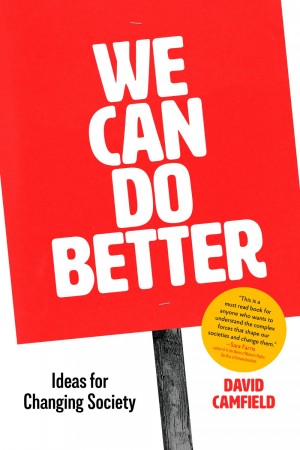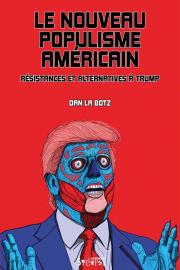Current IssueFrom the Editors
We wish our readers a Happy New Year, though we know that you take little joy in it, politically speaking. If we take no joy, we do sometimes find humor in President Donald J. Trump’s proclamations by Twitter, such as his claim that he is a “stable genius.” The current debate revolves around which of those two words is more ridiculous. Socialists, Democrats, the Working Class, and Our FutureWinter 2018
The question of the socialist left’s relationship to the Democratic Party has been a controversial
issue for decades, in truth, for as long as we have had the modern two-party system. At various
times the issue has been whether or not to break with the Democratic Party and construct a
socialist party or a labor party instead.
The Two Souls of Democratic Socialism
Fighting for the Soul of SocialismA Response to Kim Moody
Independent Politics Doesn’t Start With Walling Off the Democrats
I first met Kim Moody some 50 years ago. He was then organizing chapters of the California-based Peace and Freedom Party as an alternative to the Democratic war machine. If memory serves, he came to Park Slope, Brooklyn, then a predominantly Irish and Italian working-class neighborhood—not the gentrified picture from House Beautiful it has since morphed into—but also inhabited by a smattering of déclassé radicals. Moody wanted to interest a few of us in taking up the electoral mantle. Kim Moody Replies
Reply to Dornbush, Elliott-Negri, and LewisDornbush, Elliott-Negri, and Lewis are right that ideology is not enough and an analysis of “the actual, material terrain” is necessary. Simply repeating the well-known realities of the first-past-the-post U.S. electoral system that favors the two-party duality is not such an analysis. It’s old news. Not altogether wrong, but still yesterday’s political science. Trump and the Labor MovementA Look Beyond the Immediate Damage
We working people live in darkening times. When the Trump presidency ends in four years—if it does—we may no longer have an organized labor movement. As one of my colleagues, Ed Ott of the Murphy Institute, the City University of New York’s labor school, said to me, “We are at the beginning of the end of the U.S. labor movement based on a partnership with capital.” We are at the twilight of an era. Labor unions and collective bargaining stand to be swept away, and with them the institutions that have sheltered us in the workplace and provided us with a modicum of job security, living wages, health insurance, and pension benefits. The Environmental Justice Movement in South BaltimoreUnited Workers Take on the Multiple Crises of Capitalism
In an era when the federal government is increasingly dominated by fossil-fuel interests that limit regulation of oil rigs and pipelines, the environmental justice movement seems to have diminished significantly. Cuban Civil SocietyIts Present Panorama
A civil society emerges, mainly, due to citizens’ need to actively involve themselves in the public sphere in order to address processes that impact their daily lives and affect their interests. At the heart of civil society, various social actors, with sometimes remarkable differences, group themselves around common issues that affect or interest all of them. Therefore, civil society is plural, characterized by the spontaneous organization of citizens and based on logics of autonomy, solidarity, and representation of specific identities; it is aimed at addressing collective demands, exploring solutions to issues that affect a given community, and having an impact in the public sphere. Stalinism: The Complete Negation of Socialism
This is the last of three articles commemorating the Russian Revolution of 1917 and analyzing its fate under Stalin. The first part, “Glorious Harbinger of a New Society: The Bolshevik Revolution,” was published in New Politics, number 62, winter 2017, and the second part, “The Tragic Fate of Workers’ Russia,” in New Politics, number 63, summer 2017. The Third Camp, Socialism From Below, and the First Principle of Revolutionary Socialism
"The socialists consider it their principal, perhaps even their only, duty to promote the growth of this consciousness among the proletariat, which for short they call its class consciousness. The whole success of the socialist movement is measured for them in terms of the growth in class consciousness of the proletariat. Everything that helps this growth they see as useful to their cause; everything that slows it down as harmful." —George Plekhanov Remembering Joanne
Wholly Dedicated to Socialism From Below
The death of Joanne Landy last October is a profound loss to the socialist and internationalist movements.
Joanne died less than a day shy of her 76th birthday, and for her entire adult life, she retained a commitment to the fight for a more democratic and more humane world, and to the politics of socialism from below. Cartoon Cavalcade
In her award-winning book Red Rosa (2015), Kate Evans combined feminist biography, intellectual history, and appealing visuals to tell the remarkable story of Rosa Luxemburg. While much of the narrative focused on friendships, relationships, and personal struggles, Evans also conveyed a sense of Luxemburg as a theorist of capitalism, imperialism, and war. Comic Art in the Academy
The closing of the era when comic art specialists, not people with PhDs, wrote the outstanding and recognized works on individual artists and genres may have arrived as recently as only a few years ago. Careful biographies of artistic giants, household names (in their own eras, at least) or famed only within the field, Al Capp or Will Elder, have continued to be written by people who could rightly be called “fans”—if the title did not seem insulting. Rather than university presses, Fantagraphics or the comics series at Abrams would be a typical outlet. With each year that passes and with each swelling enrollment in a college course, the scene shifts. Exploitation and Modes of Production
The mode-of-production concept that Marx develops in Capital (although the idea is present earlier) is the essential methodological tool for understanding history, different societies, and the possibilities for social change. The Misrule of Global Capitalism
Social Inequality is not for the faint-hearted. It covers the major political-economic issues of our time, from the structural changes in the economics of capitalism, to class structure, the imperialist state, and the distortions of capitalist culture. The author, a veteran scholar-activist of the New Left generation who now lives in Costa Rica,1 ends with a plea for resistance to our oligarchic “hegemon” and suggests a series of tactics to help us on the road. Keynes, the Rabble, and Revolution
IN 1942 British economist John Maynard Keynes got an advance preview of Lord William Beveridge’s report, Social Insurance and Allied Services. In it, Beveridge proposed a comprehensive system of social security that ran the gamut from full employment to national health care so as to eliminate “Want, Disease, Ignorance, Squalor, and Idleness” from the United Kingdom. Socialism or Ecocide
Ecosocialism: A Radical Alternative to Capitalist Catastrophe, while excellent and valuable in its own right, isn’t quite the introduction to “green Marxism” that one might have expected. Michael Löwy is a veteran for decades of the democratic revolutionary left in France and a frequent contributor to New Politics. |
Blogs & On-Line FeaturesNicaragua in Pain
Writing about Nicaragua is as painful and sad as it is indispensable. Memories of the Sandinista Revolution are still alive for the generation that lived through it. To remain silent would be an affront to those who took part in that memorable insurrection against Somoza. An Israeli twist on homophobia and racism
At the mass rally held by the LGBT movement at Rabin Square on July 22, 2018, protesters not only demanded to be accepted as different, but also called for full equality. They cried out against the injustice caused by a government that excludes homosexual men from having children through a surrogate mother. All Strikes of Public Sector Workers are Now Political Strikes
Left Voice speaks with Marxist labor historian Nelson Lichtenstein on the lessons of the Teachers’ Spring and the signs of a resurgent labor movement in the U.S. The American Oligarchy: A Review
Ron Formisano. American Oligarchy: The Permanent Political Class. Urbana, Illinois: University of Illinois Press, 2017. Notes. Index. $19.95 Consumers of left-wing media are well aware that America is an oligarchy, not a democracy. Everyone with a functioning cerebrum, in fact, should be aware of it by now: even mainstream political scientists recognize it, as shown by a famous 2014 study by Martin Gilens and Benjamin I. Page. Nevertheless, it is important to continue to publicize the oligarchical character of the United States, in order to delegitimize the institutions that have destroyed democracy (insofar as it ever existed) and inspire people to take action to restore it. Ron Formisano’s book American Oligarchy: The Permanent Political Class (2017) is a valuable contribution to this collective project. An Open Letter to the NAACP About Puerto Rico
The 109th annual convention of the NAACP more Dan La Botz on his New Book on Trump and the Resistance
Dan La Botz is a member both Solidarity and of the Democratic Socialist of America (DSA), and a co-editor of New Politics. Trained as a historian of the United States and Mexico, he is also a teacher in the graduate Labor Studies program of the Murphy Institute of the City University of New York. New Politics interviews him here about his new book The New American Populism: Resistance and Alternatives to Trump (Nouveau populisme américain: Résistances et alternatives à Trump). New Politics: You’ve written a book on Donald Trump and the Resistance that most of won’t be able to read because it has only been published in French. In this book you discuss both the rise of the new populism of Sanders and Trump and its social and historical roots, but you also look at the Resistance and discuss its strengths and weaknesses, as well as examining the strategies of the left and its future. That’s a lot. Tell us a little about your book. What distinguishes it from the many books on Trump that have hit the market since he became president?
Desperately seeking socialism: why the Soviet Union’s left-wing dissidents matter today
The following text appeared on OpenDemocracy, and features a review by Gabriel Levy of Ilya Budraistkis’ book Dissidents Among Dissidents, a new collection of essays published in Russian in 2017 by Free Marxist Publishers. It was originally published on People and Nature. This new collection of essays seeks to rebalance our understanding of dissent in the late Soviet Union, drawing attention to democratic socialists from the 1950s into the 1980s. Cuba: note for a balance sheet of ten years of reforms

I. Since, at the end of 2007, Raúl Castro called for a broad national debate, ten years have passed. It was a kind of "social catharsis" of all the problems of the country. This fact can be marked as the beginning of a transformation process that has affected all the spaces of economic, political, social and subjective life in Cuba. War, Imperialism, and Class Polarization on a Global ScaleFrom East Asia to the Middle East and from South Africa to Europe
Adapted from a presentation to the Chicago Convention of the International Marxist-Humanist Organization, July 13, 2018. The AFT, Janus, and the fall of the Berlin WallReflections on AFT's national convention
Reflecting on the days I spent as a delegate during the AFT national convention in Pittsburgh (held July 13-16), I was reminded of the fall of the Berlin Wall and the collapse of Soviet Communism in 1989-90. No one predicted it, and it seemed to come out of nowhere. But peace activists in the West who organized international support for struggles of dissidents in the Soviet Union and Eastern Europe saw the social ferment.
Recent Events Leave Brave Gaza Flotilla in More Danger
Right now four small boats are on their way to Palermo, Italy, to dare a crossing to besieged Gaza. Because of the rockets from Gaza on July 13 (whatever the true story behind their launch) the Gaza Flotilla 2018 is in even more peril from a cruel IDF puffed up on its own righteousness. In 2010 the Israelis killed ten on the Mavi Marmara and have often been brutal in captures since. Notes on the Party, Reform, Revolution and the Myth of Spontaneity in Rosa Luxemburg
This presentation was given at the June 30, 2018, DSA Lower Manhattan Branch meeting/picnic. When I was in college and the Vietnam War was raging, I was president of the campus’s SDS chapter. I remember lunching with the head of our local Young Democrats. He was a decent enough liberal who also opposed the war but told me he could never be a radical because he didn’t believe in class struggle. I told him it was less a matter of what he and I believed than in what leading sections of the ruling class thought and did. Political Education: Someone’s Done It Better

David Camfield. We Can Do Better: Ideas for Changing Society. Halifax & Winnipeg: Fernwood Publishing, 2017. 168 pp. The breathtakingly rapid changes in the capitalist world around us has left basic political education by the revolutionary left trailing behind. Free the Children!

2,342 refugee and migrant children were kidnapped at the hands of the state at the US-Mexico border between May and June. Attorney General Jeff Sessions announced a zero tolerance policy that separated mainly Central American refugee children from their parents, as migrant adults were criminally prosecuted with many thrown into federal prisons. Hundreds are toddlers under the age of 4 or even babies as young as 4 months old. The average age of the children is 8. The regime also lied and said that parents who asked for asylum at regular border crossings would not be separated from their children while they did exactly that. AMLO, Mexico’s New President, Promises End to Corruption, Makes Peace with Capitalist Class
The leftist candidate Andres Manuel López Obrador, has been carried to victory in the Mexican presidential election by an enormous popular outpouring of voters hoping to improve their lives and those of their fellow citizens. Promising to drive out the political mafia that runs the country, to end the pervasive corruption in government, and to bring an end to the violence that in the last dozen years has taken more than 250,000 lives, AMLO, the left’s perennial candidate, won such a decisive victory this time that the Mexican establishment finally had to recognize his achievement.
|

 Some New Politics readers will recognize the title of this article as a paraphrase of Hal Draper’s “Two Souls of Socialism,” which appeared in New Politics in 1966. The first version, however, appeared in the socialist student magazine Anvil in 1960, just as a new generation of youthful activists was emerging, inspired to a large extent by the civil rights movement.
Some New Politics readers will recognize the title of this article as a paraphrase of Hal Draper’s “Two Souls of Socialism,” which appeared in New Politics in 1966. The first version, however, appeared in the socialist student magazine Anvil in 1960, just as a new generation of youthful activists was emerging, inspired to a large extent by the civil rights movement. After a huge bump in membership thanks to Bernie Sanders, and an even bigger one thanks to Donald Trump, the DSA continues to grow. Since its national convention in August, membership has increased from 25,000 to 30,000. We have known since 2011 that millennials have a more positive association with the word “socialism” than the word “capitalism”;1 Sanders gave this demographic shift from the cold war era a political expression, and DSA has given it an organizational expression. Now thousands on the left are scrambling to answer the question, “What do we do with this newfound energy?”
After a huge bump in membership thanks to Bernie Sanders, and an even bigger one thanks to Donald Trump, the DSA continues to grow. Since its national convention in August, membership has increased from 25,000 to 30,000. We have known since 2011 that millennials have a more positive association with the word “socialism” than the word “capitalism”;1 Sanders gave this demographic shift from the cold war era a political expression, and DSA has given it an organizational expression. Now thousands on the left are scrambling to answer the question, “What do we do with this newfound energy?”




 In June 2017, the New Politics editorial board organized an event to honor Joanne Landy. She had been diagnosed almost a year before with stage 4 lung cancer. We all knew her prognosis was very grim and thought it would be a fine thing to show Joanne, while she was still with us, how much she was loved and admired by so many, many people.
In June 2017, the New Politics editorial board organized an event to honor Joanne Landy. She had been diagnosed almost a year before with stage 4 lung cancer. We all knew her prognosis was very grim and thought it would be a fine thing to show Joanne, while she was still with us, how much she was loved and admired by so many, many people.

 Translated from Spanish by Fred Murphy
Translated from Spanish by Fred Murphy














 This essay was originally a talk at the conference held at the New School for Social Research on April 21-22, 2016.
This essay was originally a talk at the conference held at the New School for Social Research on April 21-22, 2016.